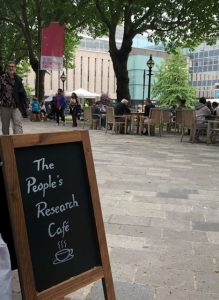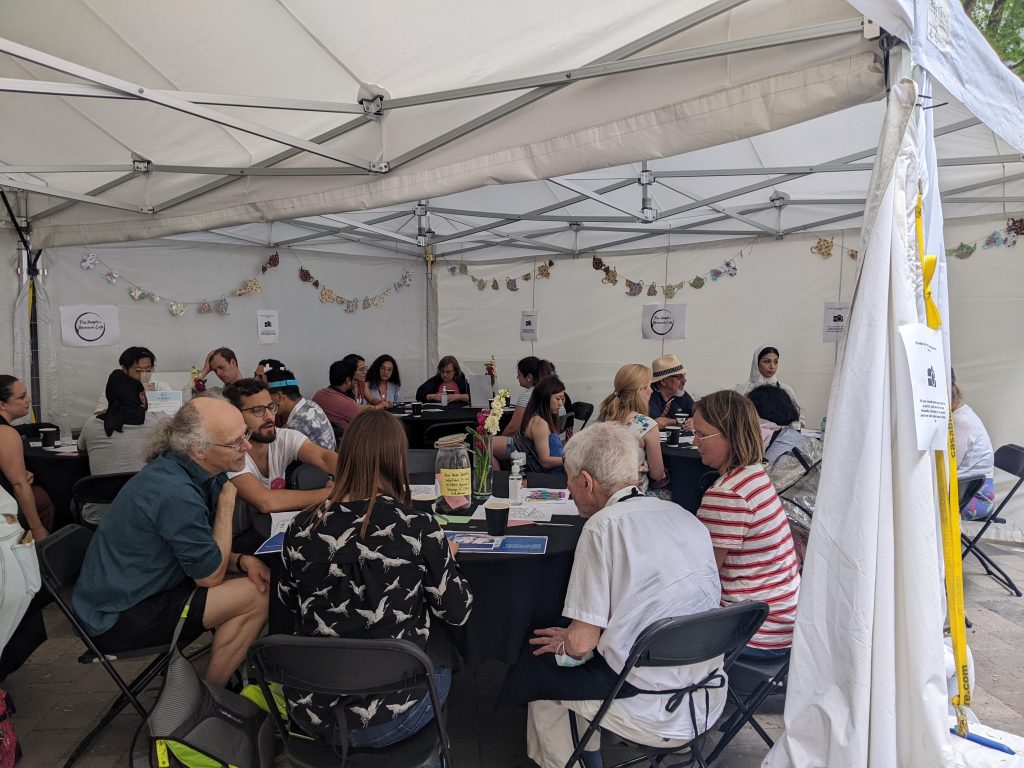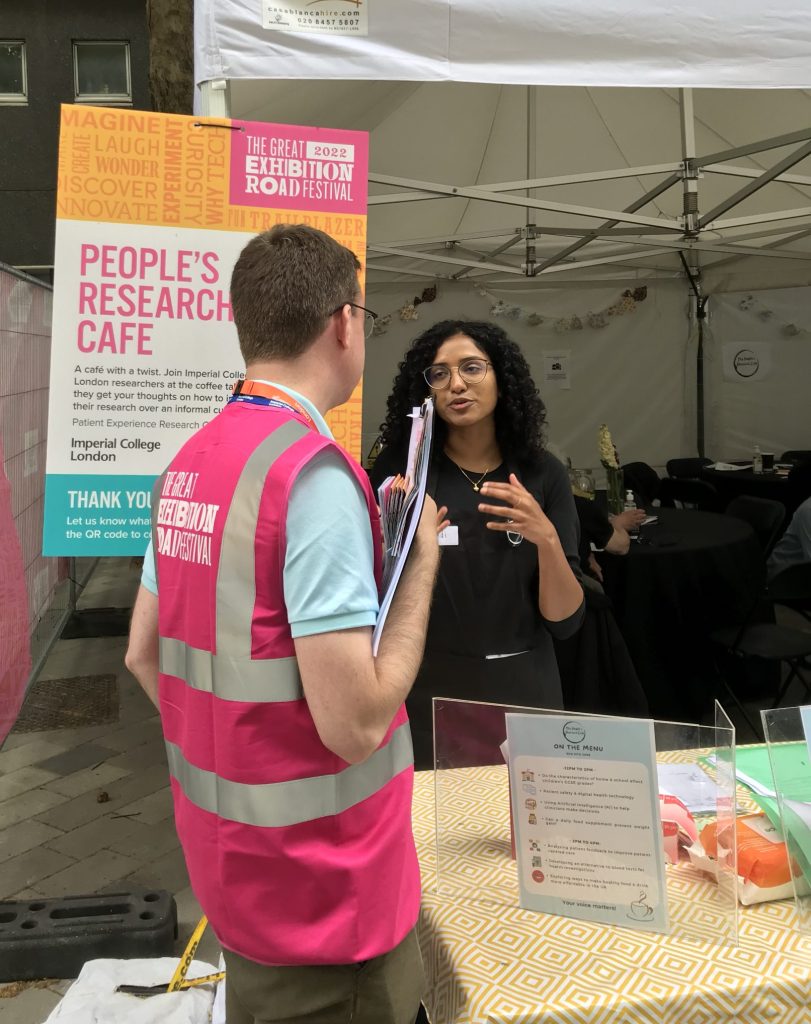- Understanding the relationship between diet and gut health
- Understanding the impact of digital technologies on patient safety
- Developing an alternative to blood tests for health investigation through a microneedle biosensor device
- A coffee for your thoughts: How and when can we personalise medicine?
- Analysing patient feedback to improve patient-centred care
- Artificial Intelligence in healthcare: exciting but complex
- Can a daily food supplement prevent weight gain?
- Developing a new technology to diagnose a virus that can lead to disabilities in new born babies
- A great day on Great Exhibition Road!
- Bringing together experts in public involvement, researchers, public partners, and the public to improve early-stage research projects
- Understanding the role of gut hormones on appetite and eating behaviour
This blog is part of a series showcasing the People’s Research Cafe which took place on the 18th and 19th June 2022 in South Kensington, London as part of the Great Exhibition Road Festival.
What is a People’s Research Café?
The People’s Research Cafe is a café with a twist. Visitors are welcomed to sit down at a table co-hosted by an Imperial College researcher and a public contributor whose role is to help the conversation flow freely. Over a free hot drink, visitors find out about the researcher’s project and will be asked for their opinions on it. The researchers are then expected to use this feedback from visitors to improve their projects. The People’s Research Café has been run previously at two Imperial Festivals (2018 and 2019) and also in four community venues. It was previously called the “PPI Café” and you can read about the one at the Imperial Festival 2018 here.
When did this People’s Research Café take place?
A People’s Research Café was hosted at the Great Exhibition Road Festival held on 18 and 19 June 2022 and was a collaboration between the following teams/centres: Imperial Biomedical Research Centre, Imperial Clinical Trials Unit, Imperial Clinical Research Facility, London In-Vitro Diagnostics Cooperative, NWL Applied Research Collaborative, MRC Centre for Environmental and Health, HPRU in Healthcare Associated Infections and Antimicrobial Resistance. Researchers from each centre were given the opportunity to apply to host a table at the Café for 2 hours where they would explain their research in plain language and ask visitors 3 questions with the help of a public contributor. It was a requirement that the research project was at a stage where visitor feedback could still influence the project. Researchers and public contributors were offered training about how the Café would work and how to maximise conversations with visitors. Ahead of the Café, researchers refined their plain language summaries and three questions to pose to visitors with the help of public involvement leads and a public contributor.
In conversation with: Sarindi Aryasinghe, Programme Manager in Digital Health and Patient Experience, NIHR Imperial Patient Safety Translational Research Centre, Imperial College, London
What research project did you bring to the People’s Research Café and what is it about?
Across the NHS, we collect tens of thousands of anonymous patient feedback comments in words and sentences through the NHS Friends and Family Test (FFT). Previously there was no way to quickly process these comments to improve patient experience based on this feedback.
Imperial College Healthcare NHS Trust and Imperial College London have used ‘natural language processing’ (NLP), a type of technology that instantly analyses words and sentences, to quickly review patient feedback so that NHS staff can understand what they need to do to improve patient experience. Through NLP it now takes 15 minutes to analyse 6000 comments, and staff are able to rapidly respond to patient needs, such as making the waiting areas in outpatients more comfortable and putting up clearer sign in Accident and Emergency.
Using NLP to process FFT feedback is proving to be promising and we are now testing and evaluating it across 15 NHS Trusts nationally to understand how NLP can better enable the use of patient feedback to improve care.
What questions did you ask visitors to the People’s Research Café about your project?
- How should we tell patients about how anonymous feedback (both positive and negative) has been used to improve care?
- We would like to use this natural language processing technology in GP and other community settings. Have you ever given feedback at your GP or when you received other community health services such as physiotherapy, vaccinations, etc.? Why or why not? What stopped you?
- If you were receiving care from the NHS for a long period of time from first seeing your GP, then being referred to the hospital for treatment, and then getting aftercare from home, how would you want to give feedback on your full experience? Why?

What did visitors tell you?
Closing the feedback loop with patients
Overall, visitors wanted to see how their feedback has been actioned. They felt that this would show that they are being listened to by their healthcare teams and would also encourage them to continue providing feedback. Knowing there was a clear and transparent process in place was also key. To do this, healthcare providers could display a summary of how feedback has been actioned in the care setting, or have it available on the practice’s website, with a link included in any digital feedback forms sent out to patients.
What encourages and prevents giving feedback at the GP
There were several factors that prevent visitors from giving feedback to their GP. Until the onset of the COVID-19 pandemic, many visitors did not know or were not asked to give feedback. Now, after a remote consultation, they are receiving an SMS text or email to give feedback digitally which many saw as a positive development. For those that had previously given feedback, they also felt discouraged as it was not clear how their feedback would be actioned. There were also fears that giving negative feedback might affect future care from the GP as they were not confident that feedback was truly anonymous.
To encourage patients to give feedback to their GP, café visitors suggested cutting down on the number of questions and asking more open-ended questions to capture all aspects of the patient experience. At the community level, having a more personalised ‘touch’ to the questions (e.g. “How was your experience today during your X appointment?”) would help to build the feedback relationship between patients and their GP. Finally, more information should be provided around how responses are kept anonymous. They felt these improvements would show that staff truly care what patients have to say.
Making sure all voices are heard in patient feedback
Overall, visitors felt there have been many positive developments of the NHS providing more digital services, particularly since the COVID-19 pandemic. However, it was important to ensure that those less familiar with technology were not excluded from giving feedback. To make the process more accessible and inclusive, they suggested using speech-to-text technology to obtain feedback over the phone, and asking for feedback in different languages. They also felt it was important for GPs to anonymously collect ethnicity, sexual orientation, and other demographic data with feedback so that all voices are heard. Practices should also proactively encourage patients to provide this information and demonstrate how their feedback is kept anonymous through educational posters on-site or online.
Giving feedback on long-term care within the NHS
There was a sense that patients were getting lost within the NHS system when receiving longer-term care. As many different healthcare teams are involved in providing care across the full patient journey (e.g. testing and screening, treatment, and aftercare), patients often do not know who is best placed to receive their feedback. Patients receiving longer term care often also have family and friends involved as carers that may want to give feedback, but it is often not clear how they can do this. A frequently suggested solution was to add a mechanism of giving feedback via the NHS app, as the app already provides patients with information about their care.

How will what visitors told you impact and/or change your project?
Our current project looks at embedding the use of patient feedback using natural language processing to improve patient experience within the NHS (across primary, community, mental health, and secondary care, with an emphasis in hospital settings). In the short-term, we will take what we have learned from the café to inform our project’s patient and public involvement strategy that is being led by our public partner lead. In the longer-term, the insights from this year’s Exhibition Road Festival have been particularly useful to help us understand what the current gaps are in patient feedback from the public perspective which we can now focus on and aim to address in future funding opportunities. In particular, we want to use cafe visitors’ contributions to improve how patient feedback is addressed through the full patient journey, particularly within community settings.
What was your personal experience of taking part in the People’s Research Café?
Participating in the People’s Research Café was a fantastic experience, and I enjoyed speaking to members of the public that had such a keen interest in our work. I would recommend participating in the café to other researchers as the public provided a lot of diverse contributions to our questions. I want to thank everyone who stopped by our table, as well as our public contributor that helped co-facilitate the session to ensure the way we were communicating about our work was clear and accessible for the members of the public at our table.
